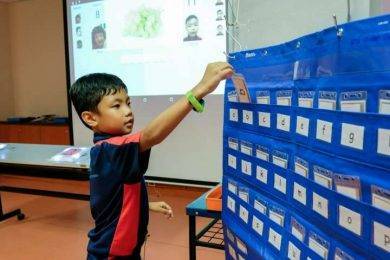The gradual integration of new technologies in education means that schools must constantly update their methods.
The implications of new technology in the classroom are enormous, but they are still in their infancy and have therefore been researched relatively little. The traditional blackboards and taking notes on paper disappear. In addition, tablets and electric blackboards are becoming more common. Children and young people have very different lives than previous generations. That is why schools and education must adapt to children, not the other way around.
So why should schools gradually change in terms of new technology in the classroom? In short, because traditional means are not enough to give today’s youth all the answers. Sticking to methods that have been around for generations does nothing else than to reduce the potential of today’s generation.
What does it mean to apply new technology in the classroom?
New technology in the classroom mainly uses tools such as image, audio, video and text. Different aspects of the material are explained on websites, but also different elements on the same level. This is one of the benefits that the technology offers. New technology is not that complex for today’s students. Children are used to being in contact with tablets, smartphones and the like. For them, the language of apps is almost intuitive. They do not need instructions or help to discover an online game – move on to the next level, win points, etc. Therefore, ways to use new technology in the classroom will help motivate and interest children in learning. In practice, this is a major challenge for educators. People generally think of entertainment when they think of technology. So how can schools use this medicine well?
Challenges for teachers and families
The use of new technology in the classroom means that schools have to carry out a major update in their learning methods. It is not possible to ignore the digital age. Instead, the educational community must strike a balance between the time and content for which they will use technology.
For example, technology in the classroom offers very interesting support when it comes to learning skills and becoming aware of the possibilities of these tools. In addition, online platforms are becoming increasingly common at all levels of education – from kindergarten to university. These include everything from social media to specific apps for each subject.
From the perspective of schools and education in general, the biggest challenge is to view digital media as just another didactic source. Finally, it is important to point out that education is a process that always involves the parents and teachers of children and young people. Pokemon Go Team Will Allow Players To Vote On The Community Day Pokemon For February. This is regardless of whether you look at traditional or more modern learning methods.
That is why the use of technology as an educational tool does not mean that everything remains in the hands of a computer or tablet. Instead, parents and teachers must guide each step in a respectful and responsible manner.
Some objections, many benefits
In the course of history, a new technology has been brought into class in every era. From educational videos to copied material, they all experienced some resistance in the beginning. Students are currently too dependent on paper. They don’t know how to write on a slate without getting chalk on them. They cannot clean a slate properly. What will they do when the paper runs out?
The level of personalization that can be achieved in the classroom with the digital age is unprecedented in traditional education. At the same time, modern technology in the classroom, given the immediacy of this time in every area of life, offers a very necessary speed.
In short, new technology in the classroom provides more interactive and accessible lessons. The possibilities are endless when it comes to using these tools. In addition, families, teachers, and educational systems generally have access to them.
Peter Sundin was born and raised in New Jersey. He has contributed to Buzz Feed, Details and TODAY and served as a commentator for NPR, MSNBC and HuffPost Live. As a journalist for Morning News Ledger, Peter mostly covers national news. Aside from earning a living as a freelance journalist, Peter also works as a dog walker.











